We may not have the course you’re looking for. If you enquire or give us a call on 01344203999 and speak to our training experts, we may still be able to help with your training requirements.
We ensure quality, budget-alignment, and timely delivery by our expert instructors.
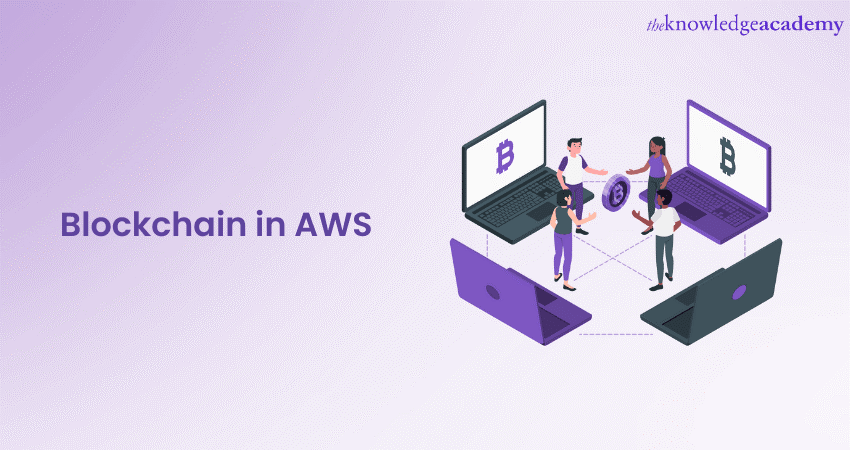
In a world abuzz with innovation, Blockchain technology continues to draw the spotlight, delivering the triple power of security, decentralisation, and transparency. Then, Amazon has upped the Blockchain game by unleashing the AWS Blockchain, simplifying the development, deployment and management of Blockchain networks. Amazon’s suite of services leverages this cutting-edge technology for a variety of applications, including Supply Chain Management (SCM) and secure data sharing. This blog dissects the reasons behind AWS Blockchain's immense power in creating scalable networks for diverse industries. So, read on to learn how this union of Cloud and Blockchain is shaping the next generation of digital trust.
Table of Contents
1) What is Blockchain in AWS?
2) Key Features of Blockchain in AWS
3) Benefits of Using Blockchain in AWS
4) How to Implement a Blockchain in AWS?
5) AWS Blockchain Templates
6) Use Cases of Blockchain in AWS
7) Conclusion
What is Blockchain in AWS?
At its core, Blockchain technology can be defined as a distributed ledger which records transactions across multiple computers or nodes. It provides transparency, security, and immutability to the data stored within it. AWS Blockchain takes this technology and simplifies its implementation, making it accessible to developers and businesses.
Blockchain in AWS is a fully managed service provided by Amazon Web Services which enables developers to build and deploy scalable Blockchain networks quickly and easily. It eliminates the need for:
1) Manual setup
2) Manual configuration
3) Manual Management of Blockchain infrastructure
This enables developers to focus more on application building and less on the underlying infrastructure.
How Does Amazon Managed Blockchain Work?
The Amazon Managed Blockchain is basically a proven solution for the creation and management of highly scalable Blockchain networks with ease. This fully managed service helps users join public networks easily. Additionally, it supports the development and management of private networks with scalability, by leveraging open-source frameworks such as Ethereum and Hyperledger Fabric. The importance of Amazon Managed Blockchain is paramount in the reduction of overheads in creating networks. It also assists in reducing overheads that are involved in joining a public Blockchain. It helps in automatic scalability for addressing the demands of applications executing millions of transactions.
Blockchain in AWS Architecture
Now that we know what Blockchain in AWS is, let's learn what is Blockchain in AWS Architecture and how Blockchain in AWS works. The digital chain of ledgers called Blockchain is made up of blocks that contain information about transactions. The second thing that is stored inside a block is called a hash. A hash is defined as a unique code that is generated whenever a new block has been created. The third thing stored in a block is a hash of the previous block.
The very first block in the whole chain, that does not store the hash of any block is called the Genesis block. This looped structure is the reason behind the security and integrity provided and maintained by Blockchain technology. If anyone tries to jeopardise the data stored in any block, it will directly affect the whole chain by altering its hash. This is why Blockchain security is invincible.
Get a complete understanding of how infrastructure and data security works in an AWS Blockchain! Register for the Introduction To AWS Security Course now!
Key Features of AWS Blockchain
Blockchain in AWS offers a wide range of features, making it a desirable option for businesses and developers seeking to leverage Blockchain technology. These features include:
a) Scalability and High Performance: Blockchain in AWS provides scalable infrastructure, allowing networks to handle multiple transactions per second without compromising performance. This ensures that applications built on the service can scale as demand increases, making it suitable for enterprise-grade solutions.
b) Easy Network Creation and Management: With the service, developers can easily create and manage Blockchain networks using preconfigured templates and automated setup processes. This process eliminates the need for manual configuration and reduces the effort and time needed to deploy a Blockchain network.
c) Integration With AWS Services: Blockchain in AWS seamlessly integrates with other AWS services, such as AWS Identity and Access Management, Amazon EC2, and AWS CloudFormation. This enables developers to leverage various AWS services to enhance their Blockchain applications and streamline the development process.
d) Security and Privacy: The service provides robust security features for protecting the confidentiality and integrity of Blockchain networks. It incorporates encryption, access control, and monitoring features to ensure the confidentiality of transactions and sensitive data.
e) Intelligent Contract Support: Blockchain in AWS helps in deploying and executing smart contracts, that can be described as self-executing contracts where the terms of agreement are written into the code. Smart contracts automate processes and ensure trust and transparency in Blockchain transactions.
f) Monitoring and Analytics: The service offers built-in tracking and analytics capabilities, allowing developers to monitor the performance and health of their Blockchain networks. They can set up alerts and notifications to stay informed about network activities and potential issues.
g) Developer Tools and SDKs:AWS provides a comprehensive set of developer tools and Software Development Kits (SDKs) for various programming languages. This helps developers to build, assess, and deploy Blockchain applications.
h) Interoperability: It is designed to be interoperable with other Blockchain platforms and networks. It supports standard protocols and APIs, enabling seamless integration with external systems and allowing data exchange between Blockchain networks.
i) Cost-effective Pricing: Blockchain in AWS offers a pay-as-you-go pricing model, allowing enterprises to pay for the resources they consume. This makes the service a cost-effective solution for both small-scale and large-scale Blockchain applications.
Prepare for success! Dive into our Blockchain Interview Questions for expert tips and insights.
How to Implement an AWS Blockchain?
Listed below are the steps to implement a Blockchain in AWS:
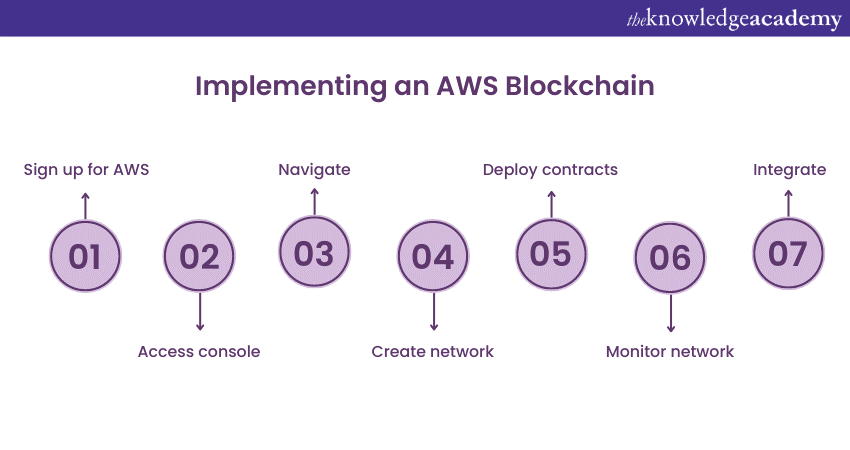
a) Sign up for AWS: If you don't have an AWS account, sign up on the AWS website. What you'll need is a valid payment method and a valid email address to create the account.
b) Access the AWS Management Console: Once you have an AWS account, access the AWS Management Console. The console is the central hub for managing all your AWS resources and services.
c) Navigate: In the AWS Management Console, navigate to the AWS Blockchain service. You can search for "AWS Blockchain" in the search bar or locate it under the "Blockchain" category.
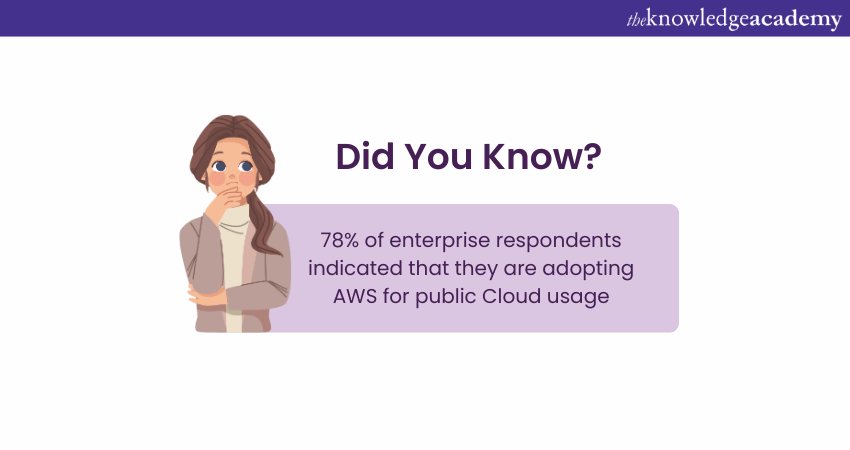
d) Create a Blockchain Network: Click on the "Create network" button to start creating your Blockchain network. Follow the interface prompts to configure the network settings, such as the name, type, and membership.
e) Deploy Smart Contracts: After creating the network, the Smart or intelligent contracts can be deployed, which are self-executing contracts with the terms and conditions stated directly in the code. They automate processes and ensure transparency and trust in Blockchain transactions.
f) Monitor and Secure the Network: It is essential to ensure the Blockchain in AWS network is secure and performing. Utilise the built-in monitoring and security features provided by the service. Set up notifications and alerts to be informed on network activities and potential security threats.
g) Integrate with other AWS Services: Blockchain in AWS seamlessly integrates with other AWS services, providing additional capabilities and enhancing your Blockchain applications. Leverage services such as Amazon EC2, AWS Identity and Access Management (IAM), and AWS CloudFormation to further optimise your application's functionality.
Increase your Amazon DevOps engineering skills with our comprehensive AWS Professional DevOps Engineer Training!
Benefits of Using Blockchain in AWS
Utilising AWS Blockchain offers several benefits to developers and businesses, such as the following:
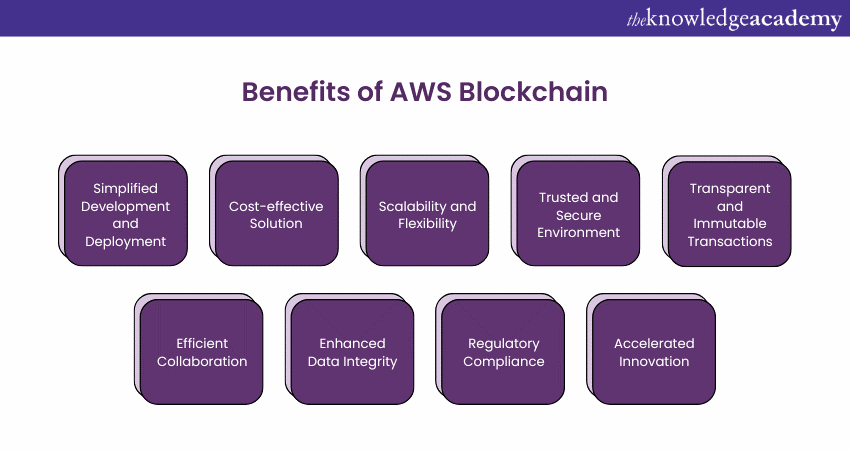
a) Simplified Development and Deployment: Blockchain in AWS simplifies the creation and deployment process of Blockchain applications by automating many of the complex infrastructure management tasks. This enables developers to focus on writing smart contracts and building decentralised applications.
b) Cost-effective Solution: By using the AWS service, businesses can mitigate the upfront costs associated with setting up and managing a Blockchain infrastructure. They can pay for the resources they consume, making it a cost-effective solution for small-scale as well as large-scale applications.
c) Scalability and Flexibility: Blockchain in AWS offers scalable infrastructure, allowing applications to handle increased transaction volumes as the network grows. It provides the flexibility to adjust the resources based on demand, ensuring optimal performance and cost efficiency.
d) Trusted and Secure Environment: As a service provided by AWS, a trusted Cloud Computing provider, the AWS service ensures a secure environment for Blockchain applications. It incorporates industry-standard security practices and enables fine-grained access control to protect sensitive data.
e) Transparent and Immutable Transactions: With AWS Blockchain, recorded transactions are transparent and immutable. This enhances trust among participants and provides a reliable audit trail for verifying transaction history.
f) Efficient Collaboration: The service enables multiple participants to collaborate and share data securely within a decentralised network. It eliminates the need for intermediaries and facilitates efficient and transparent data exchange.
g) Enhanced Data Integrity: Blockchain in AWS ensures the integrity of data stored on Blockchain. A recorded transaction cannot be tampered or altered with, providing a high level of data integrity and trust.
h) Regulatory Compliance: The service provides features and capabilities that support regulatory compliance requirements. It enables organisations to adhere to data privacy regulations and maintain proper audit trails.
i) Accelerated Innovation: By leveraging Blockchain in AWS, developers can stay focused on innovation and building unique Blockchain applications. . They can take advantage of the managed infrastructure and services provided by AWS, freeing up time and resources for creative problem-solving and value creation.
Enhance your AWS Architecture skills with Architecting on AWS Associate Training – Register now!
AWS Blockchain Templates
AWS Blockchain templates help create and deploy blockchain networks quickly by using different blockchain frameworks. A blockchain network improves the efficiency and immutability of transactions for business processes such as Supply Chain Management (SCM), international payments, land registration, crowdfunding, governance, and more.
This allows individuals and organisations who may not be familiar with one another to trust and independently verify transaction records. So essentially, you use AWS Security Hub and AWS Blockchain Templates to launch AWS CloudFormation stacks and create blockchain networks. The AWS resources you utilize depend on your chosen AWS Blockchain Template and the options you specify.
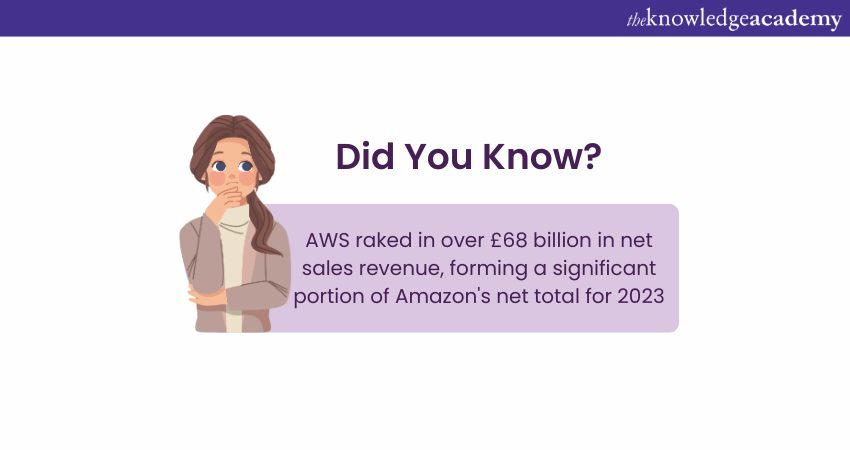
Use Cases of Blockchain in AWS
From Supply Chain Managementto healthcare and voting systems, Blockchain in AWS finds diverse applications across various industries. Its potential lies in enhancing transparency, traceability, and security in complex processes.
By exploring real-world use cases, let's uncover the tangible benefits that Blockchain in AWS brings to different sectors. These examples will illustrate how businesses can leverage the service to streamline operations, enhance trust, and drive innovation:
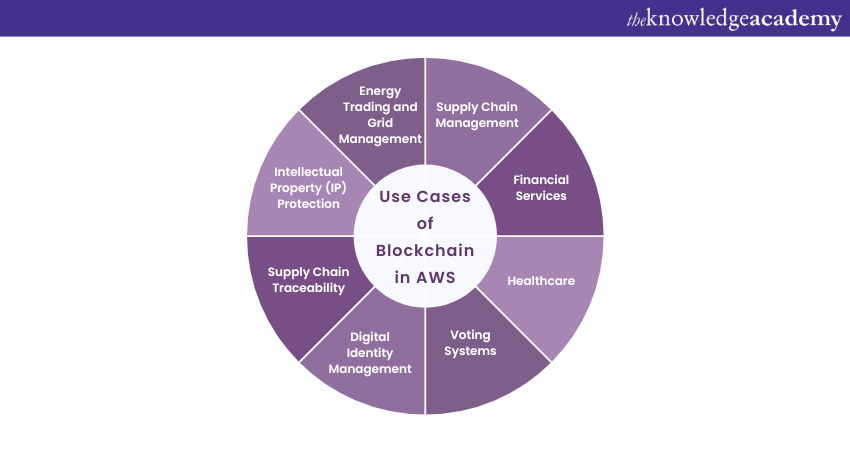
By exploring real-world use cases, we will uncover the tangible benefits that Blockchain in AWS brings to different sectors. These examples will illustrate how businesses can leverage the service to streamline operations, enhance trust, and drive innovation:
a) Supply Chain Management: Blockchain in AWS can be leveraged to build decentralised Supply Chain Management (SCM) systems. It provides end-to-end visibility and transparency across the supply chain, enabling secure tracking of goods, verification of product authenticity, and efficient management of inventory. This reduces the risk of fraud or counterfeit products.
b) Financial Services: The financial services industry benefit from Blockchain in AWS by building decentralised applications for secure and efficient transaction settlement, trade finance, and identity management. The service can streamline processes, reduce costs, and enhance transparency and trust in financial transactions.
c) Healthcare: AWS Blockchain can be utilised in healthcare to maintain secure and immutable patient data records. It ensures data integrity and privacy while facilitating interoperability between different healthcare providers. The service can improve the efficiency of data sharing and enhance patient care coordination, ultimately leading to better healthcare outcomes.
d) Voting Systems: By leveraging the AWS service, voting systems can be developed that provide transparent and tamper-resistant records of votes. The service enhances the security and integrity of the voting process, preventing fraud and ensuring trust in democratic systems. It can also simplify the process of verifying voter eligibility and maintaining accurate voter records.
Need to delete your AWS account? Learn how to delete AWS account safely, ensuring all your resources are terminated, and no billing surprises follow after closure.
e) Digital Identity Management: Blockchain in AWS can enable secure and decentralised Digital Identity Management systems. It provides a trusted platform for individuals to manage their digital identities, reducing the risk of identity theft and unauthorised access. The service ensures the immutability and integrity of identity records, enhancing privacy and security.
f) Supply Chain Traceability: With Blockchain in AWS, businesses can ensure end-to-end traceability in complicated supply chains. This enables tracking and verification of product certifications, origins, and compliance with regulatory standards. It reduces counterfeiting risks, enhances transparency, and builds trust among consumers.
g) Intellectual Property (IP) Protection: Blockchain in AWS can be utilised to protect Intellectual Property (IP) rights. It enables the creation of a decentralised registry for copyrights, patents, and trademarks, which ensures provenance and immutability of ownership. It facilitates secure sharing of Intellectual Property information and simplifies the process of verifying ownership.
h) Energy Trading and Grid Management: Blockchain in AWS can be applied to enable decentralised energy trading platforms. It allows participants to securely trade energy, track renewable energy generation and consumption, and ensure transparency in energy transactions. The service can also facilitate Grid Management by optimising energy distribution and enhancing energy efficiency.
Conclusion
In conclusion, AWS Blockchain carves a new path towards a world of transparent, secure and scalable digital solutions. From streamlining supply chains and financial services to elevating voting systems and healthcare, this suite of services from Amazon has taken Blockchain innovation to new heights. Understanding its features, use cases and benefits outlined in this blog can help you harness its power to deploy Blockchain networks quickly and efficiently.
Elevate your Amazon AWS skills with our comprehensive AWS Certification Training!
Frequently Asked Questions
What are the Recommended Best Practices for Designing and Deploying Blockchain Solutions Using AWS Services?

These are some of the best practices that you can take before deploying Blockchain solutions using AWS services:
a) Choose the right Blockchain framework
b) Always leverage the Amazon managed Blockchain for easier network
c) You need to utilise AWS CloudFormation
d) Implement good security practices
What Role Does AWS Blockchain Play in Ensuring Transparency, Trust, and Efficiency in Business Processes?

AWS Blockchain significantly enhances business processes by providing a transparent and immutable record-keeping system, fostering trust among participants. It streamlines operations through decentralised networks, eliminating intermediaries resulting in increased efficiency and reduced costs.
What are the other resources and offers provided by The Knowledge Academy?

The Knowledge Academy takes global learning to new heights, offering over 3,000 online courses across 490+ locations in 190+ countries. This expansive reach ensures accessibility and convenience for learners worldwide.
Alongside our diverse Online Course Catalogue, encompassing 19 major categories, we go the extra mile by providing a plethora of free educational Online Resources like News updates, Blogs, videos, webinars, and interview questions. Tailoring learning experiences further, professionals can maximise value with customisable Course Bundles of TKA.
What is the Knowledge Pass, and how does it work?

The Knowledge Academy’s Knowledge Pass, a prepaid voucher, adds another layer of flexibility, allowing course bookings over a 12-month period. Join us on a journey where education knows no bounds.
What are Related AWS Certification Courses and Blogs Provided by The Knowledge Academy?

The Knowledge Academy offers various AWS Certification Courses, including AWS Certification Practitioner, AWS Associate Solutions Architect and AWS Professional Solutions Architect Training. These courses cater to different skill levels, providing comprehensive insights into AWS Architecture.
Our Cloud Computing Blogs cover a range of topics related to AWS, offering valuable resources, best practices, and industry insights. Whether you are a beginner or looking to advance your AWS skills, The Knowledge Academy's diverse courses and informative blogs have you covered.
Upcoming Cloud Computing Resources Batches & Dates
Date
 AWS Cloud Practitioner Training
AWS Cloud Practitioner Training
Fri 2nd May 2025
Fri 4th Jul 2025
Fri 5th Sep 2025
Fri 7th Nov 2025






 Top Rated Course
Top Rated Course



 If you wish to make any changes to your course, please
If you wish to make any changes to your course, please


